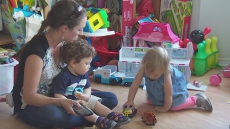If your kid is slow in language skills, then sending him or her for piano lessons can improve word discrimination as well as language proficiency, says a study.
The findings suggested that piano lessons may have specific effect on the children's ability to distinguish different pitches, which helped them to better distinguish different words.
However it did not appear to confer any benefit for overall cognitive ability, as measured by IQ, attention span, and working memory, the researchers said.
"The children didn't differ in the more broad cognitive measures, but they did show some improvements in word discrimination, particularly for consonants. The piano group showed the best improvement there," said Robert Desimone from The Massachusetts Institute of Technology (MIT).
The study, published in the journal Proceedings of the National Academy of Sciences, included data from nearly 100 children aged four or five years, who were divided into three groups -- one that received 45-minute piano lessons three times a week; one that received extra reading instruction for the same period of time; and one that received neither intervention.
After six months, the researchers tested the children on their ability to discriminate words based on differences in vowels, consonants, or tone.
The results showed that, children who had piano lessons showed a significant advantage over children in the extra reading group in discriminating between words that differ by one consonant.
Children in both the piano group and extra reading group performed better than children who received neither intervention when it came to discriminating words based on vowel differences.
"That's a big thing for kids in learning language: being able to hear the differences between words. They really did benefit from that," Desimone added.
The researchers hope their findings could encourage other schools to keep or enhance their music offerings.




